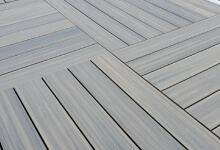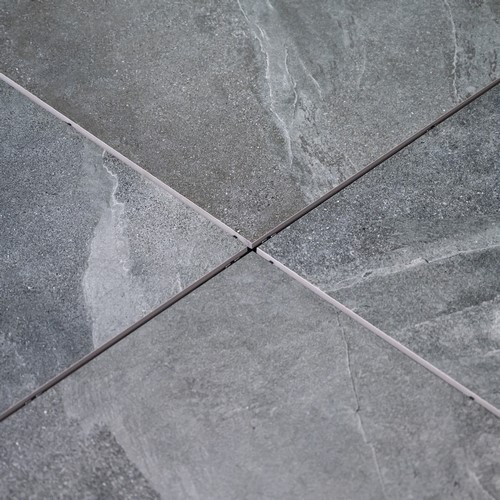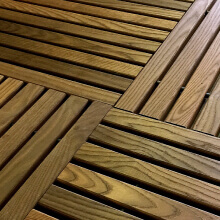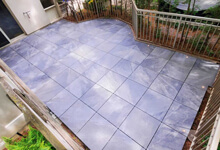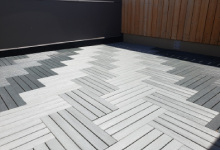Would you like to browse our deck tile products and accessories?

- By: Designer Deck
- Tags: Wood Vs. Recycled Plastic Tiles
- Category: Blog
- 0 comment
Outdoor spaces have become an integral part of modern living, transitioning from mere patches of grass to carefully curated extensions of our homes. Selecting the appropriate decking material is crucial for a successful outdoor space. Wood and recycled plastic tiles stand out as two viable options, each with its unique set of advantages and drawbacks. Let’s explore the intricacies of these materials to assist you in making a well-informed choice for your outdoor haven.
The Timeless Allure of Wooden Tiles
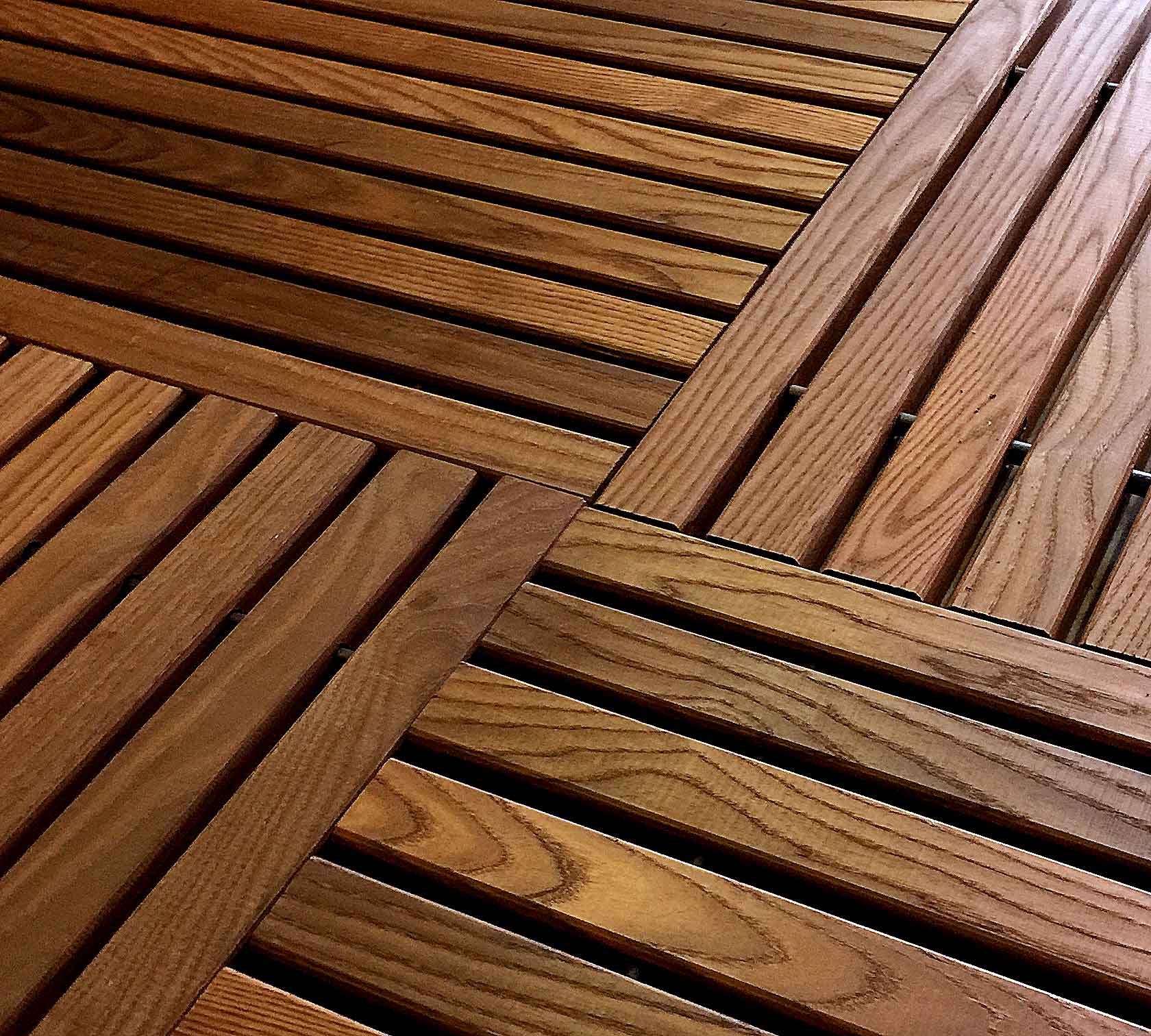
For centuries, wood has been the material of choice for decking, and its appeal remains unparalleled. There’s an inherent beauty in the natural grains and textures of wood that lends an aura of sophistication to any outdoor space. Here’s a detailed look at the advantages and disadvantages of wooden tiles:
Advantages of Wooden Tiles:
- Aesthetic Appeal: The warm, earthy tones of wood have an enduring charm. Wooden tiles emanate a timeless charm that harmonizes seamlessly with a range of architectural designs, spanning from quaint rural retreats to contemporary urban residences. They can be stained or left untreated to weather naturally, offering a range of aesthetic possibilities.
- Sustainability: Opting for sustainably sourced wood, such as FSC-certified timber, ensures responsible environmental practices. Reputable manufacturers ensure that the wood used for decking is harvest from well-managed forests, promoting the regeneration of trees and biodiversity.
- Comfort and Temperature Regulation: Wood has a natural ability to stay cooler underfoot compared to many synthetic materials, making it comfortable to walk on even during hot weather. Its temperature regulation properties make it an excellent choice for areas with diverse climates.
Disadvantages of Wooden Tiles:
- Maintenance Requirements: Wooden tiles need consistent care in order to maintain their aesthetic appeal. They need to be cleaned and sealed, periodically using an approved mixture, if you wish to protect against the elements. Harmful UV rays and harsh weather such as acidic rain, contribute significantly to the oxidization of this natural material’s look. By ignoring these maintenance tasks, color deterioration and a decrease in the product’s lifespan will occur over time.
- Environmental Impact: While sustainably sourced wood is a responsible choice, the production and disposal of wooden decking still has environmental implications. Improper disposal of sealants can lead to the release of chemicals into soil and water, causing environmental harm and degradation.
Recycled Plastic Tiles

In response to environmental concerns and the need for low-maintenance solutions, recycled plastic tiles have gained prominence in the decking industry. These tiles are made from post-consumer plastic waste, offering a sustainable alternative to traditional wooden decking.
Advantages of Recycled Plastic Tiles:
- Environmental Sustainability: Recycled plastic tiles are crafted from post-consumer plastic waste, diverting plastic materials from landfills and oceans. By transforming discarded plastic, which would otherwise harm the environment, these tiles play a vital role in diminishing the collective carbon footprint. This safeguarding precious natural resources.
Choosing recycled plastic helps promote a circular economy and minimizes the demand for virgin plastic production, contributing significantly to environmental sustainability.
- Low Maintenance Requirements: Recycled plastic tiles stand out due to their low maintenance requirements, making them a highly advantageous choice. Unlike traditional wood or other materials, these tiles do not require staining, sealing, or regular treatments to maintain their appearance and structural integrity.
They are resistant to moisture, insects, rot, and UV rays, ensuring long-lasting durability without the hassle of frequent upkeep. This convenient attribute not only conserves time and energy but also diminishes the expenses tied to long-term deck upkeep.
- Durability and Longevity: Recycled plastic tiles are exceptionally durable and resilient. These are engineered to endure diverse weather patterns, without experiencing deterioration or fading in color.
Their resistance to moisture prevents issues like rotting, warping, and mold growth, ensuring a long lifespan. This durability makes recycled plastic tiles an excellent investment, providing a stable and reliable outdoor flooring solution for years to come.
- Versatility in Design and Color: Recycled plastic tiles come in a wide range of designs, patterns, and colors, offering homeowners and designers ample flexibility in aesthetic choices. Whether you prefer the look of natural wood, contemporary designs, or vibrant colors, there are options to suit every taste and style.
This versatility allows for creative customization, enabling homeowners to create unique outdoor spaces that reflect their personalities and preferences.
- Resistance to Pests and Mold: Unlike wood, which is susceptible to insect infestations and mold growth, recycled plastic tiles are naturally resistant to pests.
This resistance eliminates the need for chemical treatments and pesticides, promoting a healthier outdoor environment. Additionally, it ensures that the tiles maintain their integrity over time, even in regions prone to humid conditions.
- Contribution to Plastic Waste Reduction: By choosing recycled plastic tiles, individuals actively participate in reducing plastic waste. The demand for recycled plastic products encourages the recycling industry and supports initiatives aimed at cleaning up the environment. This collective effort contributes to a cleaner planet, aligning with the global goal of minimizing plastic pollution.
Disadvantages of Recycled Plastic Tiles:
- Heat Absorption: One of the significant drawbacks of recycled plastic tiles is their tendency to absorb and retain heat. During sunny days, the surface can become uncomfortably hot, making it less ideal for barefoot walking. This issue can be mitigated with proper shading, cooling solutions or simply wearing the proper footwear.
- Limited Biodegradability: While recycled plastic tiles are eco-friendly in their production, they do not biodegrade easily. Proper recycling facilities are essential to ensure responsible disposal when these tiles reach the end of their lifecycle.
The Verdict: Making an Informed Choice
Choosing between wood and recycled plastic tiles ultimately depends on your priorities and preferences. If you appreciate the timeless allure of wood and are already prepare to dedicate time to upkeep, wooden tiles could be the perfect option for you. However, if you prioritize environmental sustainability, low maintenance, and versatility in design, recycled plastic tiles offer a compelling alternative.
At Designer Deck, we recognize the significance of this decision. Our range of high-quality wooden and recycled plastic tiles are designed to cater to diverse tastes and requirements. By weighing the aesthetic appeal, maintenance needs, and budget constraints, you can make a choice that aligns with your values. This transforms your outdoor space into a haven of beauty and sustainability.
In the end, whether you opt for the timeless allure of wood or the innovative eco-friendliness of recycled plastic, the key lies in making a well-informed decision. Your choice not only enhances the visual appeal of your outdoor space but also contributes to the larger environmental conversation. This will shaping a more sustainable future for generations to come.








